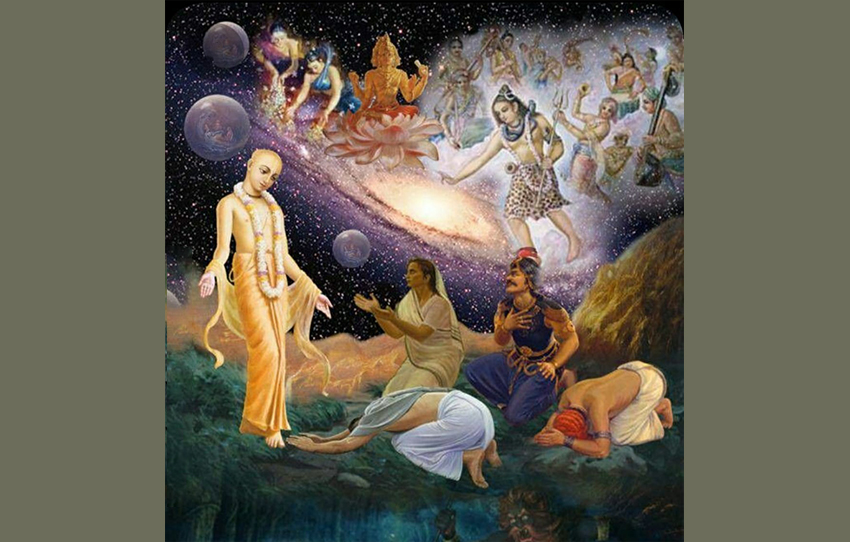NAME 32
Bhāvanaḥ भावनः
He administers the universe through the ‘law of karma’. One’s enjoyment or sufferings is only due to his own thoughts and actions. The Brahman does not cause a person to act as He remains only as a witness. Actions unfold only due to individual karmas accumulated over several births.
Brahma Sūtra (III.ii.38) says, “phalamatupapatteḥ” which means ‘the fruits of actions come from Him.’ If this is true, then the law of karma becomes obsolete. Law of karma cannot become obsolete, hence, Vedāntins argue that the Brahman presides over everything, He also ordains the results of karmas according to the quality of the karmas. Technically speaking, this argument is right because the ‘law of karma’ is enacted by the Lord. This also augurs well with the theory that the Brahman is acting only as a witness and does not partake in any actions.
३२. ॐ भावनाय नमः।
32. Om Bhāvanay Namah
Bhaavanah – To do Bhaavana is to give: One who gives everything to His devotees is Bhaavanah. The Lord is One who gives both joy and sorrow to each one according to his deserts. In the case of humanity it is He again who destroys the evil and blesses the good.
INTERPRETATION GUIDED BY SANT VANI (WORDS OF SAINTS)
Bhāvanaḥ
The giver of the fruits of action.
Many self made people (by their own admission) may think that they call all the shots, are in charge of all factors in given situations. So it seems natural, that when things don’t go their way, it is either other people’s fault or their own fault! Unknown variables which could have played a role are rarely ever taken into account. For eg: Chennai Superkings, of the IPL cricketing league, who was on a winning streak despite a good form lost to another team, Mumbai Indians. It seems that luck was not on their side, in the final game. Whatever be the type of karma, actions we are involved in, be it the results of an exam, how one’s own child turns out to be, all karma will have 4 possible outcomes:
•Results are less than expected
•Results are equal to what was expected
•Results are more than what was expected and
•Results are quite the opposite to what was expected
When we really look at it, people who are successful seem to have understood some principles of success, the connection between cause and effect; the connection between the different types of actions and the results. A psychological law that is understood by most parents is providing conducive conditions of care, education and values in a child‘s life is likely to lead to a healthy, independent and a contributing member of society. This principle, amongst many others, does not function on their own. And one can never be aware of all principles operating in the many spheres of our lives. Secular people who don’t want to acknowledge the presence of God, will attribute results to the forces of nature. But, how does one account for these forces of nature to be so flawlessly intelligent? There seems to be no answer to that. The principle often expressed as the connection between the action and the result requires a conscious being to make the connection.
Many adrsta, unknown factors, seem to play a part. Attending any temple in India, one gets an idea of the role of prayer in people’s life. One may chant a simple prayer and the result that is got is something entirely different. How the prayers bring about the results, is not clear. But, they work. So, Karma alone being jada, insentient can neither make the connection nor bring about the result. The one, who is in the form of the connection between the karma and the phala and who makes this connection, is Ishvara. He is the karma-phala-dāta.
https://os.me/does-prayers-change-things-how-does-god-answer/
Sarveṣām bhoktr ṇāmphalā nibhāvayati iti bhāvanaḥ – He is the one who gives the right results, according to their karma, to all the jīvas, who are bhoktas, the experiencers of the result. We see in the purānās, that the devotees pray to the Lord to save them from their distress and the Lord answers their prayers by taking an avatāra at the right time. So, as the giver of the results for those prayers at the right time and place, He is called Bhāvanaḥ. Thus, the previous name Saṁbhavaḥ is connected to this name Bhāvanaḥ.



